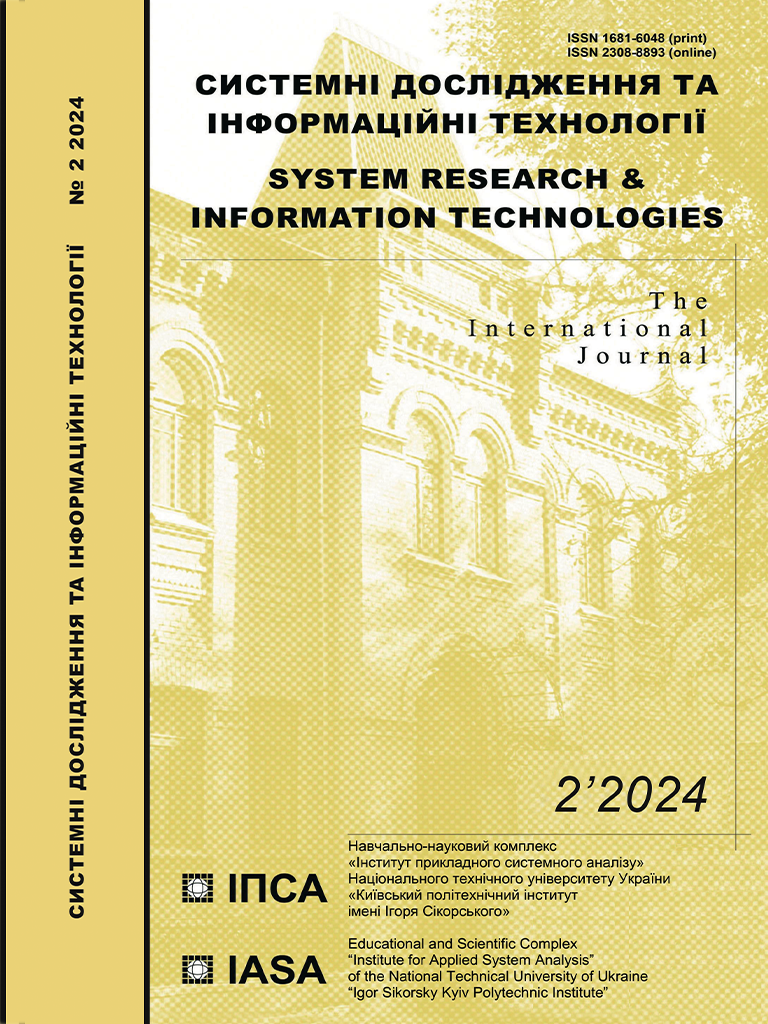Strategy of the cyber-physical system for the small business enterprise guaranteed functioning with the digital twin support
DOI:
https://doi.org/10.20535/SRIT.2308-8893.2024.2.01Keywords:
Industry 4.0, digital twin, cyber-physical systems, strategy, internet of things, computer, physical, and mathematical modelsAbstract
The article presents a strategy of the cyber-physical system guaranteed functioning for a small business enterprise (SBE), which is ensured by maintaining the digital twin and is due to its extremely high relevance in modern conditions. Business processes are linked to Industry 4.0 competencies. One of the innovations it implements is Digital Twin, a comprehensive facility support tool. Digital twin allows for tracking and effectively managing the entire cycle of an infrastructure project, from planning, procurement, and production to commissioning and maintenance of the facility. PEST, SWOT, SAW, TOPSIS, and VIKOR methods are used to build a strategy.
References
H. Lasi, P. Fettke, H.-G. Kemper, T. Feld, and M. Hoffmann, “Industry 4.0”, Business & Information Systems Engineering, vol. 6, pp. 239–242, Aug 2014. doi: 10.1007/s12599-014-0334-4
Parham Dadash Pour, Aser Alaa Ahmed, Mohammad A. Nazzal, and Basil M. Darras, “An Industry 4.0 Technology Selection Framework for Manufacturing Systems and Firms Using Fuzzy AHP and Fuzzy TOPSIS Methods,” Systems, 11(4), 192, 2023. doi: 10.3390/systems11040192
M. Grieves, “Product lifecycle management: the new paradigm for enterprises,” International Journal of Product Development, vol. 2, no. 1-2, 2005. doi: 10.1504/IJPD.2005.006669
N. Pankratova, I. Golinko, “Approach to Development of DTModel for Cyber-Physical System in Conditions of Conceptual Uncertainty,” in Zgurovsky M., Pankratova N. (eds) System Analysis and Artificial Intelligence. Studies in Computational Intelligence, Springer, Cham, vol. 1107, pp. 3–25, 2023. doi: 10.1007/978-3-031-37450-0_1
Nataliya Pankratova, Igor Golinko, “Development of DTs to Support the Functioning of Cyber-physical Systems,” Computer Science Journal of Moldova 2023-12. doi: 10.56415/csjm.v31.15
Gartner survey reveals DTs are entering mainstream use. 2019. Available: https://www.gartner.com/en/newsroom/press-releases/2019-02-20-gartner-survey-reveals-digital-twins-are-entering-mai
“The DTJourney: A smooth pathway to digital innovation,” Mevea, 2022, May 10. Available: https://mevea.com/news-events/blog/the-digital-twin-journey-a-smooth-pathway-to-digital-innovation/
Global Market Insight DTmarket. (2022). Available: https://www.gminsights.com/industry-analysis/digital-twin-market
Digital Twins Market by Technology, Twinning Type, Cyber-to-Physical Solutions, Use Cases and Applications in Industry Verticals 2023– 2028. March 2023, 154 p.
N.D. Pankratova, K. Grishyn, and V. Barilko, “DTs: stages of concept development, areas of use, prospects,” System Research and Information Technologies, no. 2, pp. 7–21, 2023. doi: 10.20535/srit.2308-8893.2023.2.01
Mohsen Attaran, Bilge Gokhan Gelik, “Digital Twin: Benefits, use cases, challenges and opportunities,” Decision Analytics Journal, vol. 6, no. 100165, pp. 1–8, March 2023. doi: 10.1016/j.dajour.2023.100165
Vedat Nalioğlu, Hazal Tokdemi, and Deniz Artan, “Adopting DTand Internet of Things in the Construction Industry: A SWOT Analysis,” Lecture Notes in Civil Engineering (LNCE), vol. 350, June 2023. doi: 10.1007/978-3-031-32511-3_169
Constanta Zoie Radulescu, Marius Radulescu, “A Hybrid Group Multi-Criteria Approach Based on SAW, TOPSIS, VIKOR, and COPRAS Methods for Complex IoT Selection Problems,” Electronics, 13(4), 789, 2024. doi: 10.3390/electronics13040789
Lidong Wang, Guanghui Wang, “Big Data in Cyber-Physical Systems, Digital Manufacturing and Industry 4.0,” International Journal of Engineering and Manufacturing, 4, pp. 1–8, 2016. doi: 10.5815/ijem.2016.04.01
Federico Pigni, Richard Watson, and Gabriele Piccoli, “DTs: Representing the Future,” SSRN Electronic Journal, 2021. doi: 10.2139/ssrn.3855535
Yu. Zaporozhets, A. Ivanov, Yu. Kondratenko, and V. Tsurkin, “Computer models for mode control of electric current treatment of melts at specified quality criteria for cast products. Part 1,” Electronic modeling, vol. 42, no. 3, pp. 53–69, 2020. doi: 10.15407/emodel.42.03.053
Yu. Zaporozhets, A. Ivanov, Yu. Kondratenko, and V. Tsurkin, “Computer models for mode control of electric current treatment of melts at specified quality criteria for cast products. Part 2,” Electronic modeling, vol. 42, no. 4, pp. 49–70, 2020. doi: 10.15407/emodel.42.04.049
D. Zhong, Z. Xia, Y. Zhu, and J. Duan, “Overview of predictive maintenance based on DTtechnology,” Heliyon, 9(4), article e14534, 2023. doi: 10.1016/j.heliyon.2023.e14534
Carlos Diaz Ruiz, Jonathan J. Baker, Katy J. Mason, and Kieran Tierney, “Market-scanning and market-shaping: why are firms blindsided by market-shaping acts?” Journal of Business & Industrial Marketing, vol. 35, no. 9, pp. 1389–1401, 2020. doi: 10.1108/JBIM-03-2019-0130
David Pickton, Sheila Wright, “What’s SWOT in strategic analysis?” Strategic Change, 7, pp. 101–109, 1998. doi: 10.1002/(SICI)1099-1697(199803/04)7:2<101::AID-JSC332>3.0.CO;2-6
C.R. Sharath Kumar, K.B. Praveena, “SWOT ANALYSIS,” International Journal of Advanced Research, 11, pp. 744–748, 2023. doi: 10.21474/IJAR01/17584
Jyoti Snehi, Abhinav Bhandari, and Gurpreet Singh, “iNIDS: SWOT Analysis and TOWS Inferences of State-of-the-Art NIDS solutions for the development of Intelligent Network Intrusion Detection System,” Computer Communications, 195, 2022. doi: 10.1016/j.comcom.2022.08.022
Youssef Lamrani Alaoui, Introduction to Multi Criteria Decision Making: TOPSIS Method. 2019. doi: 10.13140/RG.2.2.36465.22882
Morteza Yazdani, Felipe Graeml, “VIKOR and its Applications: A State-of-the-Art Survey,” International Journal of Strategic Decision Sciences, vol. 5, issue 2 pp. 56–83, April 2014. doi: 10.4018/ijsds.2014040105

